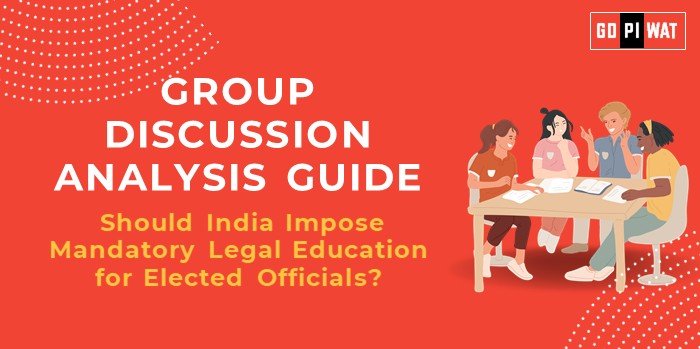📋 Group Discussion Analysis Guide: Should India Impose Mandatory Legal Education for Elected Officials?
🌐 Introduction to the Topic
Opening Context: Across democracies, the quality of governance is directly tied to the knowledge and competence of elected officials. India, with its vast and complex legal system, demands an understanding of constitutional and legislative processes.
Topic Background: Elected representatives play a crucial role in policy formulation and lawmaking. However, many lack formal education in law, raising questions about informed decision-making and accountability. This has led to calls for mandatory legal education for elected officials, a debate gaining traction in recent years.
📊 Quick Facts and Key Statistics
- Lok Sabha Members Without Legal Degrees: 90% (highlighting the gap in legal knowledge).
- India’s Legal Cases Pending in Courts: Over 40 million (requiring lawmakers to contribute to systemic efficiency).
- Proposed Legislative Training Programs: Introduced in Maharashtra and Karnataka but voluntary.
- Global Practices: Several Scandinavian countries ensure compulsory governance training for lawmakers.
👥 Stakeholders and Their Roles
- Government: Introduces policies and frameworks for mandatory training.
- Educational Institutions: Develop and deliver legal education programs.
- Civil Society: Advocates for transparency and informed governance.
- International Bodies: Provide benchmarks and best practices for legislative competence.
✨ Achievements and Challenges
🎯 Achievements:
- Capacity building initiatives such as workshops for MPs on financial literacy and lawmaking.
- Global precedents like Singapore’s mandated training in public administration for officials.
- Enhanced transparency and citizen trust.
⚠️ Challenges:
- Resistance from elected representatives regarding accessibility and implementation.
- Resource constraints like lack of funding and infrastructure for large-scale programs.
- Public perception seeing it as unnecessary, especially in grassroots politics.
🌍 Global Comparisons
- Estonia: Digital literacy training mandatory for local officials.
- Norway: Compulsory legal and ethical governance training for MPs.
📖 Case Studies
- Kerala’s Local Governance Training: Improved decision-making among panchayat leaders.
📑 Structured Arguments for Discussion
- Supporting Stance: “Mandatory legal education ensures lawmakers understand the constitutional principles they are tasked to uphold, leading to more informed and effective policies.”
- Opposing Stance: “This policy could alienate grassroots politicians who lack access to formal education, thus undermining democratic inclusivity.”
- Balanced Perspective: “While legal education is essential, it must be implemented in a phased and inclusive manner, combining formal courses with practical workshops.”
📣 Effective Discussion Approaches
- Opening Approaches:
- Cite the gap in lawmakers’ legal knowledge with data.
- Highlight a case study of governance impacted by inadequate legal awareness.
- Reference global best practices.
- Counter-Argument Handling:
- Emphasize inclusivity by proposing tailored training for different levels of governance.
- Highlight cost-effective methods like online modules for mass reach.
🔍 Strategic Analysis of Strengths and Weaknesses
- Strengths: Empowers informed decision-making, enhances public trust and accountability.
- Weaknesses: High implementation costs, risk of alienating less-educated leaders.
- Opportunities: Global leadership in governance reform, collaboration with academic institutions.
- Threats: Political pushback, potential for uneven implementation.
🏫 Connecting with B-School Applications
- Real-World Applications: Governance reforms, policy analysis, and ethical decision-making.
- Sample Interview Questions:
- “How would mandatory legal education impact policymaking in India?”
- “What challenges could arise in implementing such a policy?”
- Insights for Students: Public policy knowledge is crucial for roles in governance consulting, public administration, and corporate social responsibility.


